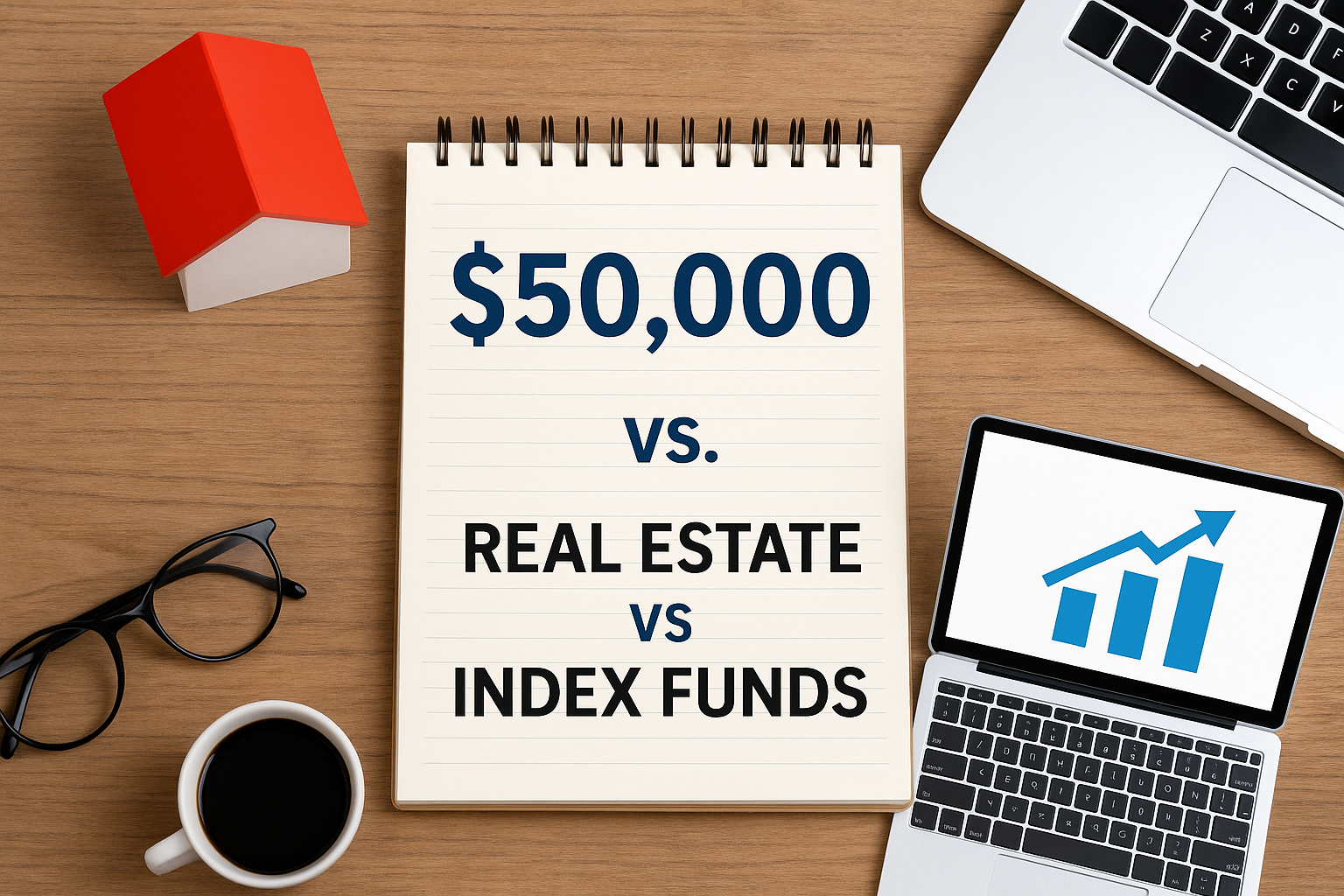
Investing $50,000 safely in 2025 is a smart move for anyone looking to grow their wealth while minimizing risk. Two of the most reliable and time-tested options for this level of investment are real estate and index funds. Each offers a unique mix of stability, growth potential, and passive income, but they serve different types of investors based on financial goals, risk tolerance, and liquidity needs.
Whether you want consistent rental income, long-term property appreciation, or prefer the simplicity and hands-off nature of index funds, understanding the pros and cons of each will help you make an informed choice.
Real Estate vs. Index Funds: Side-by-Side Comparison
| Feature | Real Estate | Index Funds |
|---|---|---|
| Risk Level | Moderate (market & tenant risks) | Low to Moderate (market-based only) |
| Initial Involvement | High (property search, closing, setup) | Low (buy and hold via brokerage) |
| Liquidity | Low (can take months to sell) | High (sell anytime in trading hours) |
| Ongoing Maintenance | Moderate to High | Very Low |
| Passive Income | Rental income | Dividend income |
| Tax Benefits | Depreciation, mortgage interest | Tax-efficiency via ETFs or IRAs |
| Historical Return | ~8–12% annual appreciation + rent | ~7–10% annual average (S&P 500) |
Option 1: Investing $50,000 in Real Estate
Real estate is a tangible asset that many investors prefer because it provides both income and appreciation. With $50,000, you may be able to:
- Make a 20% down payment on a $250,000 rental property
- Use leverage to increase your return on equity
- Benefit from monthly rental cash flow
- Deduct mortgage interest, depreciation, and operating expenses
Popular Real Estate Strategies:
- Rental Properties: Buy-and-hold single-family or multifamily homes for cash flow
- Real Estate Investment Trusts (REITs): Publicly traded companies that own property—offers diversification without the hassle
- Short-Term Rentals (Airbnb): High-yield opportunities in tourist hotspots, though with more management work
- House Hacking: Live in one unit and rent the rest (e.g., duplex)
Pros:
- Tangible asset with intrinsic value
- Can generate cash flow from day one
- Tax write-offs increase real return
Cons:
- Illiquid, takes time to exit
- Tenant and maintenance issues
- Upfront closing costs, taxes, and insurance
Option 2: Investing $50,000 in Index Funds
Index funds are an ideal way to gain exposure to the stock market without having to actively pick individual stocks. You can invest your $50,000 in a diversified portfolio that mirrors the performance of major indices like the S&P 500.
Best Index Fund Choices in 2025:
- Vanguard S&P 500 ETF (VOO)
- Schwab U.S. Broad Market ETF (SCHB)
- Fidelity ZERO Total Market Index Fund (FZROX)
- iShares Core U.S. Aggregate Bond ETF (AGG) for diversification
Investment Approach:
- Invest via a tax-advantaged account (like a Roth IRA or 401(k)) or a taxable brokerage
- Use dollar-cost averaging (DCA) if you prefer to reduce timing risk
- Stay invested long-term and rebalance yearly
Pros:
- Low cost (expense ratios often under 0.10%)
- Instant diversification across hundreds of companies
- Liquidity and transparency
- No management headaches
Cons:
- Market volatility (though usually less risky than individual stocks)
- No control over individual assets
- No tangible property or collateral
Which Is Safer?
If your priority is preserving capital with steady long-term growth, index funds may be safer due to their liquidity, diversification, and lower entry barrier.
If you’re more experienced, ready to take on landlord responsibilities, and want to leverage debt for higher returns, real estate could yield greater wealth-building potential.
Hybrid Strategy: Combine Real Estate and Index Funds
Many smart investors blend both strategies to reduce risk and increase returns. Here’s how you might split your $50,000:
- $35,000 toward real estate (down payment on investment property)
- $15,000 in index funds (build a diversified, liquid portfolio)
This approach lets you benefit from both real estate cash flow and stock market growth.
Pro Tips for a $50,000 Investment
- Assess liquidity needs: If you’ll need the money in under 5 years, favor index funds or REITs.
- Check your credit score: It influences your loan terms in real estate.
- Minimize fees: Choose low-cost index funds and negotiate real estate closing costs.
- Understand your tax bracket: It affects how your investment income is taxed.
- Avoid emotional decisions: Both markets have cycles. Focus on long-term outcomes.
Final Thoughts: Where Should You Invest $50K in 2025?
If you want steady, long-term growth with minimal effort, index funds are your safest bet. But if you’re looking for passive income and appreciation, real estate offers tangible value and strong returns—especially in growing markets.
At Harplight, we recommend aligning your strategy with your risk profile, time horizon, and lifestyle preferences. For some, the best answer may not be either/or—it’s both.
Hashtags:
#SafeInvesting #Invest50K #RealEstateVsIndexFunds #2025InvestmentGuide #HarplightFinance